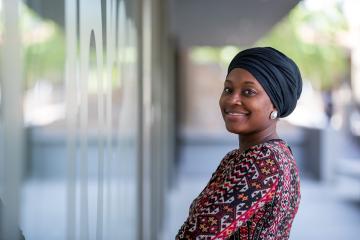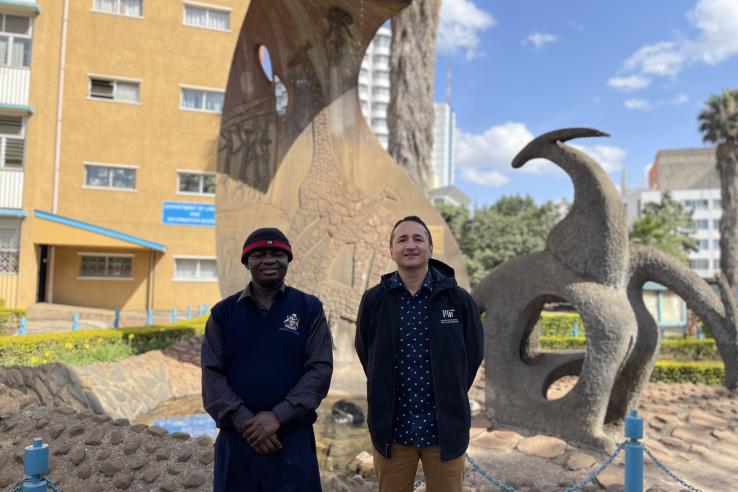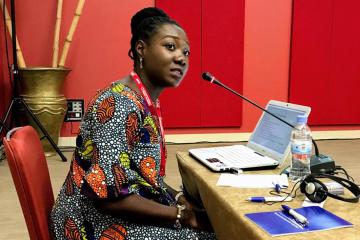
African Scholar Spotlight: Dr. Japheth Awiti Osotsi Stanley

This post is part of our ongoing series showcasing the work and perspectives of economists from the African continent who are leading randomized evaluations.
In this post, Carlos Guzman, finance and operations manager at J-PAL Global, spoke with Dr. Japheth Awiti Osotsi Stanley, a lecturer in the School of Economics at the University of Nairobi. Japheth’s primary research interests relate to human capital, labor markets, health, and poverty alleviation.
What drew you to the field of development economics and working with impact evaluations?
I’m passionate about the field of development economics because its goal is to improve peoples’ standards of living. To achieve this goal, many institutions, including governments, design and implement interventions. My goal as an African Scholar is to evaluate whether these interventions work—hopefully before they are scaled up. My wish is for governments to first design and implement interventions at a small scale and then evaluate them in real-world settings to understand their impact. In the long run, I would like to see strategic investments in interventions that have been rigorously evaluated and shown to improve peoples’ standards of living.
One of your projects was recently funded by J-PAL’s Jobs and Opportunity Initiative. What research question are you trying to answer through this project?
One of the biggest challenges we face in the world today is unemployment among youth, which is more pronounced across African countries. An idea that has been discussed recently is that certain soft skills, including interpersonal communication and self-control, which are not taught as part of formal curricula in schools, have the potential to alleviate unemployment. These soft skills have the potential to enable young people to tell their personal and professional stories effectively when participating in job interviews or pitching business ideas to potential investors and customers.
The Ajira Digital Program trains young people in soft skills to bridge their transition between school and employment. This program, led by the Kenyan government, provides young workers with tools, training, and mentorship to earn an income through online workspaces. My project focuses on understanding which features of the program effectively empower young adults to get a job, create their own job, or stay employed. If the Ajira project effectively increases employment, the results have the potential to help inform formal school curricula.
What do you see as some of the big research questions in Kenya that randomized evaluations may be able to help answer? Do these questions relate to any studies you are excited to work on in the future?
I am interested in understanding why there is high unemployment, especially amongst young people, despite many investments in employment programs by governments, NGOs and private institutions targeting the same group. Randomized evaluations allow us to test whether these interventions alleviate labor market issues so that, in the future, decision-makers are informed when making investments to improve people’s standards of living.
I am also interested in researching our education system. If given the opportunity to design an educational system from scratch, what kind of curriculum should we implement to effectively prepare youth for the labor market and employment? Many countries around the world, especially in Africa, struggle with this question. I would like to design and implement an intervention that helps us understand what educational curricula could address this problem.
How can organizations like J-PAL continue to build on the support they provide to researchers based in Africa?
J-PAL is the first organization that I know of which offers proposal development grants, which makes it very unique within international development. Funding opportunities that require complete proposals can be cost-prohibitive for scholars who don’t have resources to travel and collect data for developing these proposals.
J-PAL’s proposal development grants allow African scholars to expand efforts to generate locally grounded research while designing, implementing and running evaluations that have policy impact and drive our own research agenda. It also generates mentoring and coauthoring relationships, as well as opportunities to teach how to conduct randomized evaluations in our own universities. The J-PAL African Scholars mentoring program and training opportunities have been a great source of support for developing successful proposals.
Two pieces of advice that I can offer are, first, that J-PAL calls for proposals around specific topics within research initiatives. It would be helpful if African scholars, like myself, have the opportunity to propose topics for funding calls related to policy-relevant research that is urgently needed in African countries. I see a great need for investments in rigorous research on health and human capital interventions in Africa.
Second, many organizations in the international development space prefer to fund evaluations of large government programs. Since these programs usually involve a significant amount of financial resources, they have great visibility and are very attractive for evaluations. One significant challenge with evaluating these programs is that there can be confusion between evaluations and audits of the program, or government officials can have concerns about public scrutiny around evaluation results. In addition, It would be helpful if evaluations of small-scale interventions are also considered alongside evaluations of large-scale government interventions at the time of selecting proposals. Such small-scale interventions, if found to work, can then be marketed to governments for scale-up.
Do you have advice to offer aspiring African scholars thinking about a career in economic research?
One of the biggest challenges we have in Africa is the lack of opportunities from the government to train early career researchers. My advice to aspiring African Scholars is to take advantage of organizations like J-PAL that offer multiple educational, training, and mentoring opportunities to build a portfolio of empirical research and lead your own research agenda.
It is also critical to connect and collaborate as much as possible with other researchers doing similar work. This is a great opportunity to learn from each other, improve our work, and generate more impactful research.


